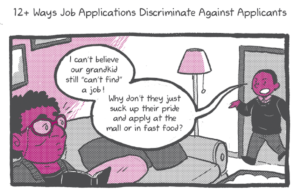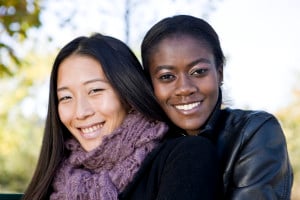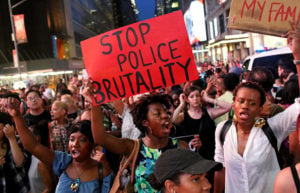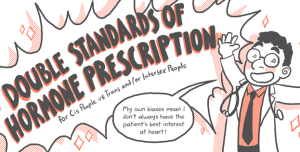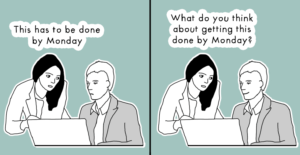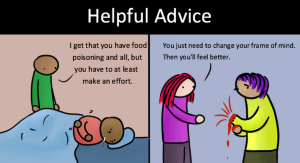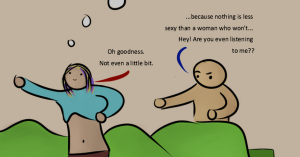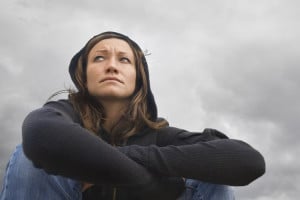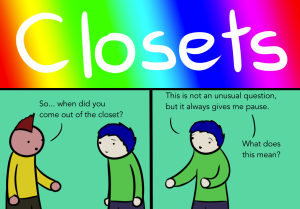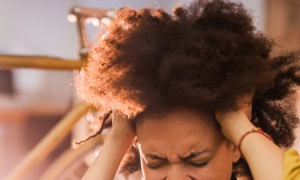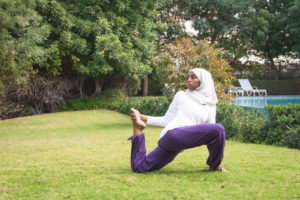
Muslim person practicing yoga outside in a garden.
I remember when the Paris attacks happened in 2015, the Muslim community scrambled to convince the world that we were peaceful people. Muslim folks were terrified and were recalling the similarities between their emotions after 9/11.
We remembered our fear, our self-policing, and the feeling of exhaustion in proving that we were not the demons the world seemed to be hell-bent on proving that we are.
A few weeks later — after seeing countless posts from my Muslim friends who were fearful, upset, apologetic, and anxious, just from being Muslim in an atmosphere that relentlessly demonizes us — I wrote a post on Facebook encouraging people to embrace their humanness and to take care of themselves:

Amidst such whirlwinds of events, it’s easy to lose ourselves. We often don’t realize until it’s too late just how big of a toll it takes on our overall wellbeing. We scroll, scroll again, like, comment, argue and repeat every day, hoping that this will make the world a better place.
Through it all, we’re slowly internalizing the idea that the world wasn’t a good place and that there is no place for us.
But the world gets tough sometimes, and it’s okay to know that you need time to take care of yourself. I went through so many self-care articles, phases of needing space, conversations, and have asked many people what helps them get through the darkness.
With that in mind, I’ve compiled a list of self-care tactics that I hope you can utilize in your day to day:
1. Get off social media
For so many vulnerable communities, one of the most important ways to mobilize and know what is actually happening is through social media platforms.
Through these platforms, we’re able to hear others’ stories that can help us stay alert when we leave our houses. We are able to learn what places to avoid. We are able to hear narratives for ourselves through engaging with other Muslims.
But we also find ourselves defending ourselves. On social media, it’s easy to stumble upon an article and spend hours explaining and defending ourselves.
We see an article or post from our racist facebook friends from high school and we are so hurt that they ever thought of you or your people with such narrow racist visions. And it gets to us, I know it does. For so many of us, this is the lens we fought so hard to not internalize.
There are times that it becomes overwhelming. I think it is important to consider taking a step back and deactivating your social media if you can.
I remember there were so many times I would be extremely occupied with debates and arguments on social media that I would think, “Oh my god how will I leave the house tomorrow? What a horrible world to be a part of, everyone hates us.”
These feelings have isolated me from even the kindest strangers when I could have felt warmer and more encouraged in their presence — the older Black woman on the subway who chatted with me about the book she was reading. The Latino boy who I exchanged silly faces with as he headed home from school with his father. These for me were moments I would not have shared had I internalized the drainage of social media.
To take care of a community and to mobilize, you need to take a step back sometimes. If you are constantly consumed by all of the pain in the world, how can you convince others that there is light worth fighting for?
Step out of the bubble sometimes and remind yourself of the things that are worth fighting for. This way, I think we can come back stronger than ever.
The injustices will not disappear just because I turn off my Facebook but when I do — when I am no longer constantly reminded that I am not wanted — I am able to reconnect with my own humanity.
I also want to note that some of us only have safe spaces and comfort from communities online or rely on social media for work and income. As such, social media breaks may not be possible for everyone. Remember to do whatever makes you feel comfortable and good about yourself.
2. Take self-defense classes
With a spike in hate crimes against Muslims — hate crimes against Muslims rose 91% since the start of 2017 according to advocacy group CAIR (Council on American Islamic Relations) — many of us have a legitimate fear of leaving our homes.
Muslim women have created support groups to check in on each other. Campus ‘escort systems’ and initiatives like The Accompany Project in New York City allow volunteers to escort Muslims who fear violence while navigating their cities and campuses.
These acts of solidarity are beautiful, but I still agree with many activists before me who have urged women to learn how to defend themselves.
Organizations, such as WISE, started offering self-defense classes geared towards Muslim women. It is important for Muslim women to have the courage and confidence to stand our ground in times when we feel threatened.
There are also websites and resources for disabled Muslim women to learn self-defense such as Critaedo, which was created to educate disabled folks on self-defense and fitness.
Many times we do not have choices but to fight for our lives. With the consistent violence committed towards Muslim women, we must refuse to become victimized narratives in the media — we must learn to take control.
Violence against Muslims is used to dehumanize us and deny us our right to self-defense — ‘See? We were peaceful and we still got hurt’ — but we are entitled to self-defense. Defend yourself. Take classes. Watch videos online. Work out to become strong.
Self-defense becomes a form of self-care when it allows us to reclaim ourselves and our space. We must do so by making sure we can face the most unsafe place: the streets.
3. Surround yourself with good energy
This is crucial because it may mean that sometimes you may need to take a step back from those in your social circles, or maybe it means readjusting some of it temporarily.
When talking about politics — or whenever the world gets too heavy — meet up with a friend who shares your interest in something that brings you joy.
If you love cake-decorating, make plans with someone who can share that happiness with you. If you enjoy reading sci-fi fiction, find a book club around the area or go to a bookstore and sit and read. If you like gardening, buy new plants at a nursery or visit a florist.
I love, love, watching Modern Family when I feel the world weighing heavily on me. I have always felt that, after watching an episode (or 2, 4, 6 episodes), I feel much better than going in. For me, this is the key to finding good energy.
Remember: you are entitled to detach yourself from spaces that weigh heavily on you. You are entitled to place yourself in space that makes you feel good — about yourself and about the world.
4. Poetry and reading
This, for me, is revolutionary. I cannot feel better without reading poetry. Sometimes it is a call home for me — a call to my humanness, a reconnection with something larger than just feeling blue.
If I feel unwelcomed, I read reminders of words calling me to love the larger world or to survive, unwanted, in this world. It is both a celebration and a recognition of our pain, and for most occasions, it is liberating to read.
One of my favorites is Wild Geese by Mary Oliver, which reminds us that we do not have to be good or perfect, we can simply be human.
Another is Audre Lorde’s A Litany for Survival, which ends with: “So it is better to speak remembering we were never meant to survive // serving as a reminder that I am not alone in this pain — so it is better to love, speak, sing knowing that we were never meant to. It is a call to liberation.”
I encourage you to read poetry by Audre Lorde, Rupi Kuar, Warsan Shire, June Jordan, and Sonia Sanchez. These women of color poets are a call to home and a reminder of our beauty, resilience, and vulnerability. Take care of yourself by letting yourself be guided by their words.
5. Mindfulness and Prayer
Islam is an integral part of who I am as a person. This means that I find motivation through verses in the Quran that resonate with me. One of my favorites is: //Verily with every hardship there is ease// and //Do not despair of Allah’s mercy//.
The most liberating emotion for me is the idea that I’m not in charge. To remind myself that there is something larger than me that will ease whatever hardship I am experiencing now is a little comforting. The idea that this, too, shall pass.
I focus on prayer and self-reflection as a part of my process. I pray extra prayers, donate something to a charity that I care about, reach out to my loved ones — these are all parts of my religious practice that help me recenter.
If this isn’t for you, mindfulness and self-reflection are important. Sit alone for a few minutes with no distractions and come into yourself again in a way that does not let anything outside you interfere with your well being.
Mindfulness is taking a moment and focusing on your now —the sounds around you, your breathing, and your flow of thoughts. It is important to take a step back and reconfigure your placement in the larger part of the world.
It is liberating and comforting to let go, so I recommend practicing prayer and/or any act of mindfulness that works for you.
6. Move your body!
Working out is the most difficult practice for me. I am not consistent with getting up and moving my body. However, it is important to get your blood flowing.
I’m not saying you have to do intense workouts, but try to find ways to remind your body that it matters, that it can feel things outside of despair, anger, or disappointment.
For those of us who are unable to work out or move our bodies due to disabilities, there are options that may help guide you to find workouts that you can do. These sites cover seated exercises that range from cardiovascular, strength, and flexibility exercises and may be useful for wheelchair bound.
Reconnecting to your breath is important. You can do this through something as simple as stretching for 10 minutes, doing an hour-long workout, going to a yoga class, or even taking a 15-minute walk.
Remember to move your body — get your blood flowing and your chest beating so that you can refocus your energy on your body and yourself rather than the frustrations outside of it.
7. Ask for help when you need it
This is probably the most vital part of this list. As Muslim women, we often believe that we need to be invincible. We are taught to be strong and fearless in this world because we come from a legacy of strength.
We are not supposed to break in the face of the hate around us, or we are made to believe we have weak faith or faltering foundations. This takes an immense toll on our general well being and does not make our work in social activism sustainable.
Sometimes, we are too angry, hurt, frustrated at the world and it can feel like, no matter what we do, we are unwanted. In many of our communities, we are taught to pray it away or to remain powerful in the face of the isolation of this world.
There is a popular narration of the Prophet Muhammed, stating, “Islam began as something strange and will revert to being strange as it began, so give glad tidings to the strangers.” Some us are able to reclaim it as power but, for some, it serves as further evidence of our unwantedness.
When it gets to be too much, we must learn to reach outside of our pain and ask for help. There are hotlines we can call, therapist appointments that can be made, and vulnerability that needs to be explored with those we trust.
***
As a community, speaking up about the need to take care of ourselves can cause a ripple effect and link our individual well being to larger acts of community resistance.
As Audre Lorde once stated, “Caring for myself is not self-indulgence, it is self-preservation, and that is an act of political warfare.”
If living is a form of resistance, then we must perfect it. We must learn to fight for our happiness, our right to love and health, and the pursuit of safety and liberation.
This ripple effect cannot grow without a seed: you. You must commit to nurturing yourself so that you can help to make the world a more beautiful, sustainable place for all to exist within.
[do_widget id=’text-101′]
Hadiya Abdelrahman is an Everyday Feminism Reporting Fellow. Hadiya graduated from Rutgers University with a double major in Women and Gender studies and Middle Eastern Studies. Hadiya currently works with refugees and asylees in NYC. When she’s not at work, Hadiya writes angry rants and poetry. She enjoys writing about topics that focus on refugees, intersectional feminism, and state violence against people of color.
Search our 3000+ articles!
Read our articles about:
Our online racial justice training
Used by hundreds of universities, non-profits, and businesses.
Click to learn more





